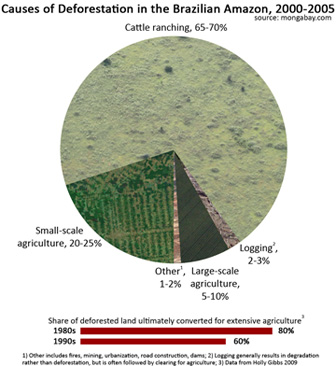Extensive deforestation for low-yielding cattle production means some Brazilian beef carries a disproportionately high carbon footprint, reports a new study published in Environmental Science & Technology.
Researchers at the Swedish Institute of Food and Biotechnology found that sixty percent of the Brazilian beef industry’s carbon emissions come from just six percent of producers: the small group of ranchers that clear Amazon rainforest for cattle production. 60-70 percent of land deforested in the Brazilian Amazon ends up as cattle pasture.
“We have calculated in many different ways in the article, and no matter how we do it, we arrive at the conclusion that Brazilian beef is a heavy producer of carbon dioxide,” the authors said in a statement. “The snag is that this 6 percent of beef production causes about 25 times more carbon dioxide emissions than beef produced in the rest of Brazil. This means that the average for carbon dioxide emissions caused by beef production in Brazil is twice as high as that in Europe.”

|
Taken as a whole, the high average emissions could hurt the competitiveness of Brazilian beef in the marketplace. The authors suggest that certification systems could help low and moderate emissions producers distinguish their beef from high emissions producers provided carbon footprint accounting standards properly incorporate emissions from land use change. They note that current carbon accounting standards often fail to account for all emissions sources.
“Consumer-driven changes of agricultural practices can support the changes called for, but environmental certification schemes that do not include more extended effects of land use change will not help to reduce the pressure for changes like deforestation since current export production often is sourced from non-newly deforested land,” they write. “The Brazilian beef example developed here illustrates the need to maintain the search for methodology to include land use change in estimating the environmental impacts associated with agricultural and forest products.”
The researchers conclude by warning that increasing global food demand will put additional pressure on forests.
“The basic problem is that we are eating an increasing amount of meat. For every new kilogram we eat, the risk of deforestation increases,” said study co-author Christel Cederberg.
CITATION: Christel Cederberg, U. Martin Persson, Kristian Neovius, Sverker Molander, Roland Clift. Including Carbon Emissions from Deforestation in the Carbon Footprint of Brazilian Beef. Environmental Science & Technology 2011 45 (5), 1773-1779
Related articles
Deforestation emissions should be shared between producer and consumer, argues study

(11/19/2009) Under the Kyoto Protocol the nation that produces carbon emission takes responsibility for them, but what about when the country is producing carbon-intensive goods for consumer demand beyond its borders? For example while China is now the world’s highest carbon emitter, 50 percent of its growth over the last year was due to producing goods for wealthy countries like the EU and the United States which have, in a sense, outsourced their manufacturing emissions to China. A new study in Environmental Research Letters presents a possible model for making certain that both producer and consumer share responsibility for emissions in an area so far neglected by studies of this kind: deforestation and land-use change.
Concerns over deforestation may drive new approach to cattle ranching in the Amazon

(09/08/2009) While you’re browsing the mall for running shoes, the Amazon rainforest is probably the farthest thing from your mind. Perhaps it shouldn’t be. The globalization of commodity supply chains has created links between consumer products and distant ecosystems like the Amazon. Shoes sold in downtown Manhattan may have been assembled in Vietnam using leather supplied from a Brazilian processor that subcontracted to a rancher in the Amazon. But while demand for these products is currently driving environmental degradation, this connection may also hold the key to slowing the destruction of Earth’s largest rainforest.
Activists target Brazil’s largest driver of deforestation: cattle ranching

(09/08/2009) Perhaps unexpectedly for a group with roots in confrontational activism, Amigos da Terra – Amazônia Brasileira is calling for a rather pragmatic approach to address to cattle ranching, the largest driver of deforestation in the Brazilian Amazon. The solution, says Roberto Smeraldi, founder and director of Amigos da Terra, involves improving the productivity of cattle ranching, thereby allowing forest to recover without sacrificing jobs or income; establishing a moratorium on new clearing; and recognizing the economic values of maintaining the ecological functions of Earth’s largest rainforest.







